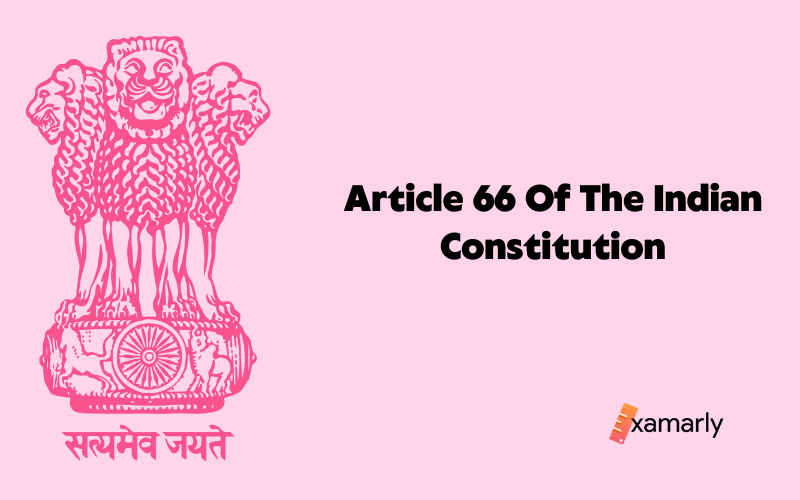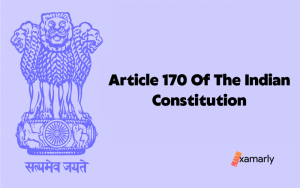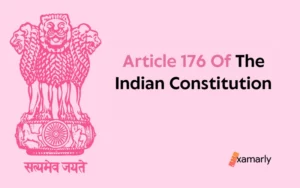Introduction
Today, we will reflect on one of the most important articles of the Indian constitution. Article 66 of the Indian constitution is among those articles that talk about the most prominent people involved in the government. You must be wondering what is so important in this article. Trust me as we will go further in this article, we will discover how important is this one for the nation as a whole.
The Vice-President of India is one of the most important holdings as a designation after the President. The importance of this can be understood from the fact that in case of any mishappenings with the working of the President, the Vice-President is the only one who takes up the responsibility of being in charge.
Let us delve deep into the concept and context and understand what is being said.
Article 66 of the Indian Constitution – Overview
Article 66 of the Indian Constitution talks about the provisions regarding the elections of the Vice-President. It specifies the eligibility, criteria, and validation of being a candidate for the position of the Vice-President of the country, among other important aspects.
Article 66 of the Indian Constitution – In Detail
Let us now understand each clause of Article 66 of the Indian constitution and try to break it into simpler words so that you can have a great understanding of every single clause.
Clause 1 – As it is & Explained
“66. Election of Vice President
(1) The Vice President shall be elected by the members of an electoral college consisting of the members of both Houses of Parliament in accordance with the system of proportional representation by means of the single transferable vote and the voting at such election shall be by secret ballot”
Clause 1 says that the Vice-President of India shall only be elected by the members of the people who form the electoral college. These members in the electoral colleges are elected by the larger mass of the population. Together, after being elected they form the electoral college and then elect the Vice-President of India.
The elections are held as per the system of proportional representation. Proportional representation works on the principle that one who wins the elections shall only win if he has the majority of the votes. So the candidate can only achieve the office of the Vice-President of the country if he secures most of the votes in the electoral college.
Clause 2 – As it is & Explained
“(2) The Vice-President shall not be a member either of Parliament or of the Legislature of any State, and if a member of Parliament or of the Legislature of any State be elected Vice-President, he shall be deemed to have vacated his seat in Parliament or such Legislature, as the case may be, on the date on which he enters upon his office as Vice-President.”
According to the second clause of Article 66 of the Indian constitution, the Vice-President shall not be the existing member of the Parliament or any legislature of the state. That means he should not be an existing member of any house of Parliament and also he should not be a member of any State Legislature.
Even, in a case where he is an existing member of any of the Houses of Parliament, he has to consider vacating that Office of Profit on the date he has to join the office as the Vice-President of India.
Clause 3 – As it is & Explained
“(3) No person shall be eligible for election as Vice-President unless he-
(a) Is a citizen of India;
(b) Has completed the age of thirty-five years; and
(c) Is qualified for election as a member of the Council of States.”
Clause 3 reflects upon the eligibility criteria for entering into the elections for Vice-President of India. It says that in order to fight the elections for the Vice-President Of India, a person should be an Indian citizen lawfully, must be elder than 35 years of age, and is qualified for election as a member of the council of states.
Clause 4 – As it is & Explained
“(4) A person shall not be eligible for election as Vice-President if he holds any office or position of emolument under the Government of India or the Government of any State or under any local or other authority subject to the control of any of the said Governments.
Explanation.-For the purposes of this clause, a person shall not be deemed to hold any office or position of emolument by reason only that-
(a) He is a minister either for India or for any State for the time being specified in Part I of the First Schedule; or
(b) He is a minister for any State for the time being specified in Part III of the First Schedule, if he is responsible to the Legislature of the State, or, where there are two Houses of the Legislature of the State, to the Lower House of such Legislature, and if not less than three-fourths of the members of such Legislature or House, as the case may be, are elected.”
Clause 4 Of Article 66 of the Indian constitution says that if any person who is holding any Office Of Profit under the government of center, under the government of any state, or under any local authority.
Also, the fourth clause refrains from considering anyone holding the Office Of Profit if he is a minister either in the central government or any state government for the time that has been specified in part 1 of the First Schedule. He will also not be regarded as the holder of the Office of Profit if he is the minister for any state for the time that has been specified in Part 3 of the Frist Schedule.
Related Article – Article 65 Of The Indian Constitution
Summing Up
As we learned that the provisions for the election of the Vice-President Of India are quite critical. Article 66 of the Indian Constitution is indeed an important one among all the others as it lays down the roadmap for the elections.
In my point of view, the only reason of being so many critical constraints regarding provisions in our constitution that exists is to ensure the proper distribution of power. The power should not be exploited in any way and in this Article, not to win elections unlawfully and unethically.
What is the minimum age required to become the Vice-President Of India?
The minimum age required to become the Vice-President of India is 35 years.
Who elects the Vice-President of India?
The Vice-President of India shall only be elected by the members of the people who form the electoral college. These members in the electoral colleges are elected by the larger mass of the population. Together, after being elected they form the electoral college and then elect the Vice-President of India.






